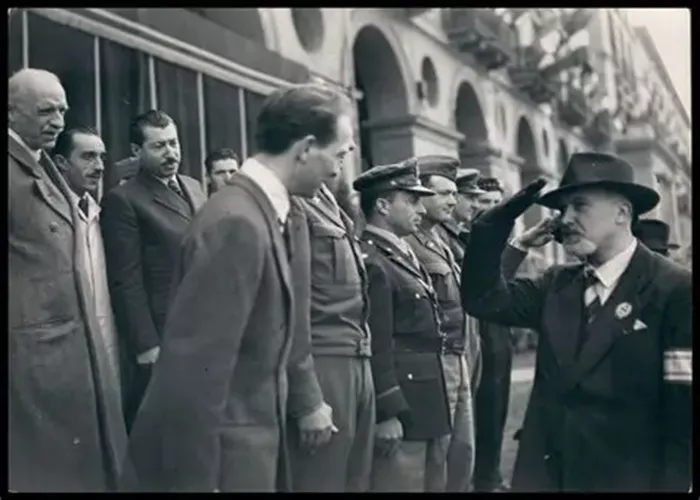The notable figures of Italian poetry in the twentieth century, Franco Antonicelli stands as a significant literary voice whose works and political engagement deeply influenced Italian poetry and culture. contemporaries.
Early Life and Context
Born in 1902, Franco Antonicelli grew up during a period of great turmoil and transformation in Italy. The early decades of the 20th century saw Italy transition through the devastation of World War I, the rise of fascism, and the turmoil of World War II. These historical events shaped the intellectual and artistic climate in which many Italian poets developed their voices. Antonicelli’s work cannot be separated from this context; his poetry is deeply intertwined with his political resistance against fascism and his advocacy for freedom and human dignity.
As an Italian poet, Antonicelli was also a journalist, essayist, and a publisher, roles that expanded his influence beyond poetry into the wider literary and cultural scene of Italy. He was actively involved in anti-fascist activities, which influenced the themes of resistance, exile, and memory in his poetry.
Literary Style and Themes
Franco Antonicelli’s poetry is marked by clarity, directness, and emotional depth. Unlike some of his contemporaries who embraced experimental or hermetic styles, Antonicelli’s Italian poetry tends to favor lucid language and strong moral and social engagement. His poems often evoke images of suffering, loss, and hope, reflecting both personal and collective experiences of the 20th century.
The themes of exile and political oppression recur frequently in his work, highlighting his own experiences and those of many Italians during fascist rule and the subsequent wars. His poetry also engages with the landscape and history of Italy, merging personal memory with national identity.
Antonicelli in the Context of 20th Century Italian Poets
When discussing 20th century Italian poets, it is important to place Antonicelli alongside other influential figures such as Giuseppe Ungaretti, Eugenio Montale, and Salvatore Quasimodo. While Ungaretti is known for his hermetic style and exploration of existential themes, Montale’s poetry is often marked by complex symbolism and philosophical depth. Quasimodo, like Antonicelli, was deeply engaged with political themes and the human consequences of war.
Antonicelli’s poetry shares with these poets a profound concern with the human condition, but he tends to express this through more straightforward language and a clearer political message. His commitment to anti-fascist ideals places him within a tradition of socially conscious Italian poetry that seeks not only to explore human emotions but also to confront political realities.
Political Engagement and Literary Influence
Franco Antonicelli’s role as a political activist and publisher was critical in shaping Italian poetry during the mid-20th century. His work in publishing helped promote other poets and writers who were opposed to fascism and who sought to renew Italian literature in the post-war period. His influence extends beyond his own poetry to his contributions in fostering a literary community committed to freedom and democratic values.
Antonicelli’s political engagement also brings his poetry closer to the movement of Italian neorealism, which emerged in literature and cinema as a response to fascist censorship and the horrors of war. Neorealist writers and poets aimed to depict reality truthfully and often highlighted the plight of the common people, a concern that is evident in Antonicelli’s work.
Major Works and Legacy
Although Franco Antonicelli’s poetic output may not be as extensive or internationally famous as some of his contemporaries, his works are essential to understanding the relationship between literature and politics in 20th century Italy. His poems, essays, and editorial work contributed significantly to the cultural resistance against fascism and helped shape post-war Italian literary identity.
Antonicelli’s legacy is that of a poet who never separated art from life. His commitment to justice and memory through poetry offers a powerful example of how Italian poetry in the 20th century responded to history’s challenges.
Comparison with Contemporaries
In comparison to Giuseppe Ungaretti, Antonicelli’s poetry is less abstract and more grounded in direct social and political concerns. Ungaretti’s brief, fragmented verses contrast with Antonicelli’s often narrative and morally engaged style.
Compared to Eugenio Montale, whose poetry is characterized by elusive symbols and introspective moods, Antonicelli’s verses are more explicit in their political message. Montale’s works often contemplate existential uncertainty, while Antonicelli’s are calls to conscience and action.
Salvatore Quasimodo, another contemporary, shares with Antonicelli a focus on the suffering caused by war and oppression, but Quasimodo’s style is more hermetic and lyrical. Antonicelli’s Italian poetry is generally more accessible, emphasizing clarity and the social function of poetry.
Italian Poetry in the 20th Century: Broader Trends
The 20th century was a period of great diversity and innovation in Italian poetry. Movements such as Futurism, Hermeticism, and Neorealism emerged, each bringing new techniques and themes to the literary landscape. Poets experimented with form, language, and content to reflect the rapidly changing world.
Franco Antonicelli’s place in this spectrum is notable for his commitment to clarity and political engagement. His poetry serves as a bridge between the avant-garde experimentation and the socially committed literature that marked much of Italy’s mid-century cultural production.
Conclusion
Franco Antonicelli remains a vital figure among 20th century Italian poets. His work exemplifies how Italian poetry can serve both as an artistic expression and as a form of political resistance. Through clear, powerful language and themes of exile, memory, and justice, Antonicelli contributed to the rich tradition of Italian poetry that grapples with the complexities of modern history.
As Italian poetry evolved throughout the century, figures like Antonicelli ensured that poetry remained relevant to the social and political realities of their time. His legacy continues to inspire those who see poetry as a means to both understand and change the world.

